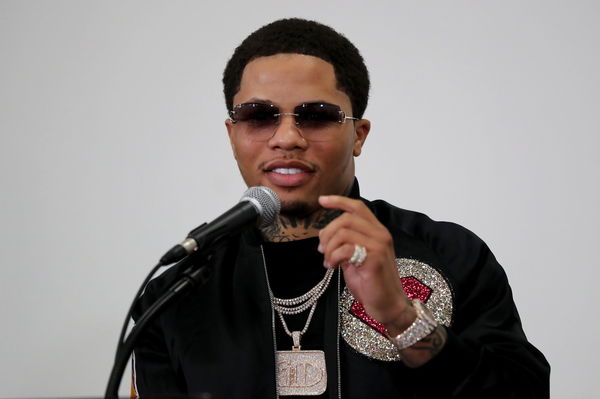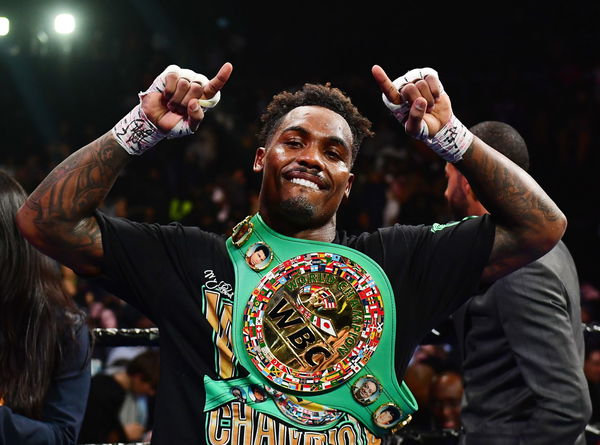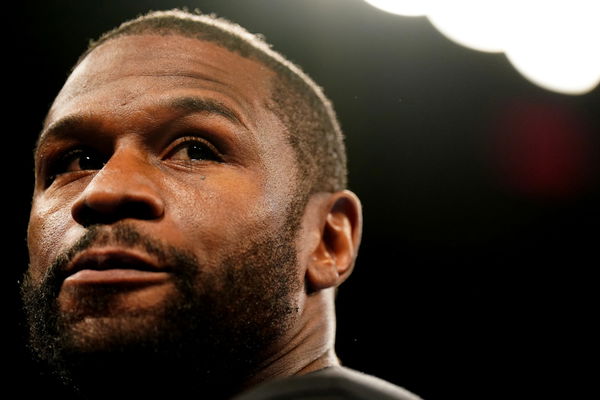Why Did Sports Stars Like Muhammad Ali, Mike Tyson, and Kyrie Irving Convert to Islam? Did Gervonta Davis Follow the Same Path and Embrace Islam

Follow Us

via Getty
BROOKLYN, NY – JULY 29: Gervonta Davis answers questions during a media availability on July 29, 2017 at the Barclays Center in Brooklyn borough of New York City. (Photo by Elsa/Getty Images)
Gervonta Davis, the undefeated boxer with 29 wins, has recently made headlines in the boxing world by announcing his conversion to Islam. This revelation adds another layer to what has already been an eventful year for the Baltimore native, marked by significant victories inside the ring and personal challenges outside of it. This includes a stunning KO victory against Ryan Garcia in the 7th round of their fight in April. However, things took a sudden turn for him after he was detained and later arrested for a hit-and-run incident dating back to 2021.
Amidst his trial, we also saw him setting an example by buying run-down properties in his old neighborhood in order to turn them into affordable housing for the needy. Now, with his conversion to Islam at a Maryland mosque, he joins a list of notable sports individuals who similarly converted to Islam after being born as Christians. Names like Muhammad Ali, Kareem Abdul-Jabbar, Mike Tyson, and even Kyrie Irving are also famous athletes who converted to Islam at the peak of their careers. But what prompted them? Let’s find out.
What prompted Muhammad Ali, Mike Tyson, and Kyrie Irving to convert?
ADVERTISEMENT
Article continues below this ad
Muhammad Ali
Muhammad Ali, often referred to as ‘The Greatest,’ underwent a profound transformation in 1964. Following his victory over Sunny Liston, Ali, then known as Cassius Clay, encountered the Nation of Islam, a religious group that was gaining prominence, particularly among African Americans because of the injustice and discrimination they were facing at the time.

via Imago
Boxing champion Muhammad Ali prays at a Mosque with a congregation of Muslims.
Ali’s meeting with Malcolm X, one of the leaders of the Nation of Islam, played a pivotal role in his decision to embrace Islam. Ali not only converted but also changed his name as a symbolic rejection of racism. Throughout his life, he remained a vocal advocate for Islam, even in the face of Islamophobia following the 9/11 attacks. At the time, Ali was suffering from Parkinson’s disease and could barely speak. Yet, he made great efforts to make a public appearance and promulgated the idea of peace instilled in Islam. Ali emphasized the peaceful teachings of Islam, stating, “I am a man of Truth, I wouldn’t be here representing Islam if it was really like the Terrorist made it look….Islam is peace.”
Trending

Canelo Alvarez Sums Up Gervonta Davis vs. Ryan Garcia Rematch in Four Words
May 01, 2024 02:25 PM EDT

A Far Cry From Floyd Mayweather’s Treatment of Him, Gervonta Davis Applauds Kevin Durant’s Support for Anthony Edwards
April 30, 2024 09:32 AM EDT

“It’s Just Too Much for Me”: Jermall Charlo Contemplates Retirement as Rivalry With Caleb Plant Reaches Boiling Point
May 01, 2024 04:02 PM EDT

Controversial Boxing Insider Confirms Floyd Mayweather Fans’ Worst Fear Amidst Dubai Debacle
April 29, 2024 09:21 PM EDT

“I Shouldn’t Have Took This”: Ryan Garcia Comes Clean on Failed Drugs Test as Devin Haney Breaks Silence
May 02, 2024 04:07 AM EDT
Get instantly notified of the hottest Boxing stories via Google! Click on Follow Us and Tap the Blue Star.

Follow Us
Mike Tyson
Mike Tyson, another boxing legend, also converted to Islam after facing personal challenges. Tyson’s conversion occurred in the aftermath of his 1992 conviction for rape. Influenced by Malcolm X, Tyson found solace and hope in Islam. Unlike Ali, Tyson’s conversion was not directly linked to the social-political climate but rather served as a source of personal redemption. Decades later, Tyson continues to speak highly of Islam, expressing his commitment to living by the Quran.
Decades after his conversion, Tyson speaks highly about Islam and does not shy away from citing the prophet. In an old interview, he stated his commitment to the religion, stating, “Will I die for Allah? Yes. Is Allah in my heart? Yes.”
Kyrie Irving
Not just in boxing, but even in basketball, there have been instances of multiple athletes like Kyrie Irving and Kareem Abdul Jabbar who have converted to Islam. Abdul Jabbar converted in 1968 during a period of social and political upheaval, inspired by figures like Malcolm X and Ali. Both athletes cited the pursuit of civil rights and the freedom to hold their own beliefs as reasons for their conversions.
Meanwhile, Kyrie Irving, the Australian-American basketball player, who converted in 2021, actively embraces his faith, observing practices like fasting during Ramadan. According to him, his religion is a significant part of his life and it is for his own betterment.

Everything about Gervonta Davis’ conversion to Islam
ADVERTISEMENT
Article continues below this ad
ADVERTISEMENT
Article continues below this ad
Edited by:

Gokul Pillai

